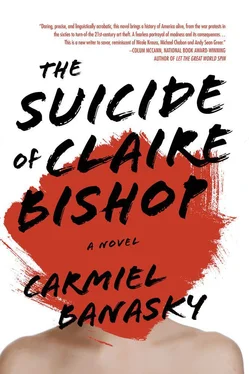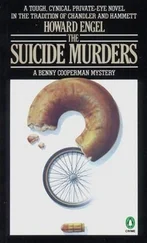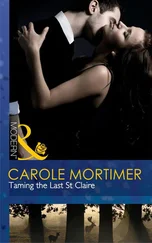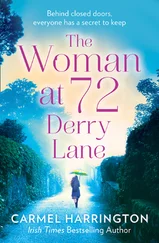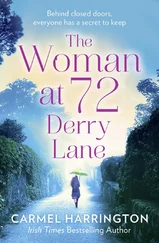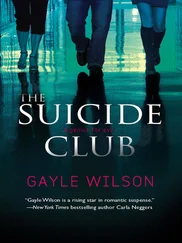The public defender still had acne on his face, but he’d held her painting like an apostle. He’d told her not to say anything, that she could trust him. Samantha hadn’t bothered to show and it was easy for the young lawyer to prove it was a property dispute to be dealt with in the divorce proceedings, that the theft charges shouldn’t stand. “As you can see plainly,” he’d said, pointing at each falling face in the painting, “it’s her likeness. There’s no question here.” The painting was restored to her. She was let off without so much as a reprimand. But, somehow, Claire felt she’d failed.
Claire would have to find a payphone and call Tomasz after all, or a locksmith. She leaned her painting against the railing and sat down. She hugged her legs and rested her chin on her knees, making herself small. In the cold, on her stoop, her whole body was finished. It was used, unfed, every morsel of skin and muscles exhausted.
During the three-minute arraignment, Claire had wanted to jump up, to cover what felt like a great exposure, something very private revealed to all these public people. The judge had leaned forward, sleep still in his eyes, and looked at the painting. The officer had looked at the painting. The court bailiff had stopped shuffling papers to look at the painting. The lawyer, he’d looked and looked at the painting. Everyone stared at her torn body falling through the air — but no one said anything to indicate that this was strange. That it was bad. That it was a bad painting, an evil painting, that it should be found guilty.
Claire balanced a tray with four glasses of Tang and four Wonder Bread sandwiches as she walked into the den. If she didn’t feed Jill and the boys they’d eat nothing but potato chips.
“Tonight’s about draft demographics,” Jill was saying to the other three — Lawrence, Carlos, and Bird — who were sprawled on the floor and couch. They’d been arguing over whose speech to use at their rally that night.
Lawrence plopped himself dramatically on the couch. “I worked hard on that speech.”
“Me too,” Bird said, pulling his long hair down so it shielded his eyes.
Then Carlos started dancing in the corner of the room. He did the Twist and the Jerk and the Mashed Potato. Often, when tensions rose, he would lie on the floor and wriggle.
Jill ignored him and said to Lawrence, “We’ll use your speech at the next rally. All right?”
They would go on like this until everyone conceded to Jill. But they were content in their roles: Carlos designed flyers and banners and called himself art director. He’d even created a logo for their collective: an outline of Cassius Clay’s head that he stitched onto each of their black masks. Bird was responsible for direct action, calling government officials at dinnertime, posting Carlos’s flyers. And Lawrence was on media, clacking away at his op-eds on a typewriter set up on the den floor.
Carlos was Puerto Rican. Bird was Jewish. Jill was Italian. Lawrence was a Negro. These boys could not have been more different from one another, but even now Claire had a hard time telling them apart. They were inseparable. She called them the Lost Boys in front of Mary. But they weren’t lost.
Her Village apartment had been transformed into the temporary headquarters of their small, rogue collective. She’d stressed “temporary” and had agreed to let them stay until the divorce hearing two months away, no longer.
Claire set the tray on the coffee table and the four said thank you in unison.
It looked as if a bomb had gone off in the den — clothes strewn over the couch, sleeping bags piled in corners. Large strips of fabric with black paint cloaked the backs of chairs. They slept through the afternoon, drank enough beer to sustain an army, and smoked marijuana and cigarettes all day, the windows shut against the cold — all paid for by Bird, unbeknownst to whomever sent him his allowance. But Claire imposed no rules. She wasn’t their mother; she wasn’t anything to them.
Freddie would have hated their cheap beer and smoke, draped as thickly as their rubbish over all the furniture. But she no longer linked the apartment to Freddie. She had re-associated every corner of it; her memories of him, even in their bed, had been overwritten. Claire could just imagine Mary stumbling in and thinking she’d mistaken the address, but Claire hadn’t had Mary over in many months. Her home may have been unrecognizable, but it felt more like home with the boys. There was movement; there was purpose in the air.
“Hey, Claire — you like Elvis?” Carlos asked between sticky bites.
“Yes,” she said, leaning in the doorway. “As a matter of fact, I do.”
All four burst out laughing. “Hey,” Bird said, “Claire likes Bubblegum!”
“It’s not Bubblegum. I like nice music. Like Joni Mitchell. And the Beatles. Not whatever you had on yesterday. The Jugs.”
“The Fugs,” said Lawrence.
They laughed again and she couldn’t keep from smiling. “I’m going to the library for a few hours. Don’t set the couch on fire.” She was a regular at the Sixth Avenue library, where she was attempting and failing to teach herself family law.
Jill raised his sandwich in cheers and grinned at her. “We’ll get to that legal stuff later this week, you bet,” he said, then turned back to the Lost Boys. “Make the poster say two a.m. in the park under the hanging tree.”
Claire left them then. The less she knew, the less Freddie and his legion of lawyers could hold against her if she was found out. And she didn’t want to hear the rest, who they were meeting, what plans. Other young men in black masks, illicit but harmless enough, draping peace flags from the rooftops of office buildings or rallying in front of a politician’s apartment. They always came home smelling of sweat and spray paint.
Jill was the oldest of their gang at twenty-four. He told her he’d flunked out of law school while he was getting high. “Harvard Law,” he’d said with what Claire swore was a touch of pride, despite his disdain toward that lifestyle. He’d offered to help with Claire’s divorce settlement but hadn’t yet found the time. He’d never taken the bar but advertised himself quietly in Village coffee shops as unofficial counsel for draft deferments. There was something thrilling about his confidence and the moodiness that seemed to accompany it. After yelling himself hoarse at a rally, or giving the boys one lecture or another, he would sometimes lock himself in the bathroom, first making sure the others didn’t need it. Claire tried not to imagine what he did in there. Perhaps he only needed the quiet.
The fact of his youth alone reminded her of the older man she’d met at the Goethe Institute: at forty-two, she was nearly right in the middle of both their ages, as old to Jill as the man was to her. Jill, a quarter the man’s age, had the same passion for dissent as the gray-haired man had for Wagner and Bordeaux. “You know nothing about your wine, do you?” the well-traveled gentleman had said at a reception. Claire pretended to be offended, then went home with him that afternoon, rubbed against him while it was still light out. Then he took her to the movies: Who’s Afraid of Virginia Woolf? Elizabeth Taylor was fat for it, and on her fifth husband. Claire said so and the man laughed. But with his hand on her thigh illuminated by the screen, nothing much was funny. She could see more clearly in that dark theater than she could in his uptown apartment with floor-to-ceiling windows and all the sunlight money could buy. She could see so clearly in the dark: this is my life. She wanted to leave, but it was the middle of the movie.
He called her a thinner, better Elizabeth Taylor. She pouted and said most people thought she was a rather plain Lauren Bacall, which was partly true — though Freddie was the only one who’d ever said so, and only once. Claire lay naked on his sofa under a thin quilt not meant to be used. He cooked her dinner, which no man had ever done for her, borscht and brisket. And the next morning he woke her up with Wagner and danced her around the living room and said she made him feel young again. To which she laughed and said, “I’m not young.” And he said to her, “You don’t know, do you? You don’t know anything. Not even wine.”
Читать дальше
